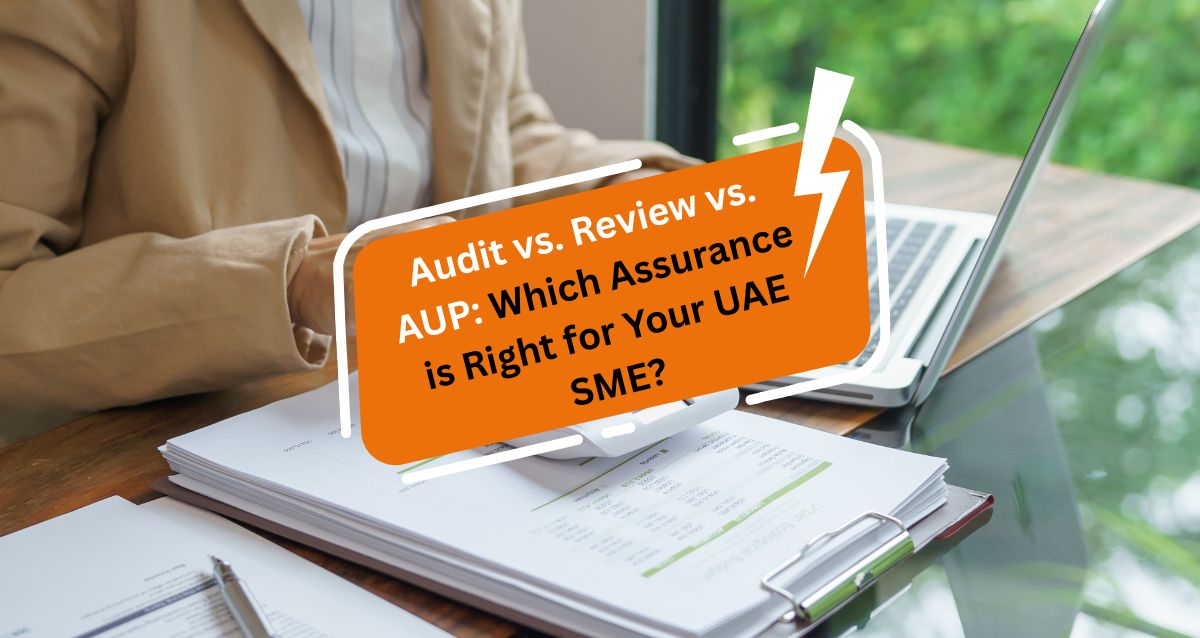Audit vs Review vs AUP UAE
In the UAE, for Small and Medium-sized Enterprises (SMEs), staying in line with financial compliance is feeling very difficult. They are struggling to manage with the legal and regulatory compliance on one side and pressure to control costs on the other side. The major point of confusion and frequent chance of unnecessary expenses or complicated regulatory errors lies in differentiating between the various financial assurance services like Audit, Review, and Agreed-Upon Procedures (AUP).
Making a mistake in one for the other can lead to paying for a full-scope audit when a targeted review would be sufficient, or critically, submitting an inadequate report when full legal compliance demands an audit.
To plan for smart and compliant financial management in the evolving economy of the UAE, it is crucial to understand the core differences in scope, cost, and level of assurance. This blog outlines the three key services to help your business select the most suitable option, taking into account its size, legal requirements, and budget.
1. Statutory Audit: The Gold Standard of Assurance (High Assurance)
The Statutory Audit is the most comprehensive form of external financial scrutiny. It is aiming to provide the maximum level of assurance to stakeholders, regulators and the general public.
What is an Audit?
An audit is a systematic and independent examination of the financial records and statements of an entity. It involves a deep analysis into the business’s internal policies and controls, examination of transactions with third parties (like banks and suppliers) and a complete check of compliance with applicable laws and International Financial Reporting Standards (IFRS).
Level of Assurance and Report
The core output of a full statutory audit is the Independent Auditor’s Report, which expresses a Reasonable Assurance on the financial statements of an entity.
- Reasonable Assurance: It is a high level of assurance, confirming that the financial statements are “presented fairly in all material respects” and are free from material misstatement, whether due to error or fraud. It does not provide complete assurance, but it is the strongest professional opinion available on the financial statements
- The Auditor’s Opinion: The statutory audit report concludes with an opinion (e.g., Unqualified/Clean, Qualified, Adverse or Disclaimer) on the true and fair view of the company’s financial position.
When is an Audit Mandatory in the UAE?

In the UAE, maintaining your audited financial statements is not always a choice; it is often a legal requirement:
1. Mandatory Free Zone Compliance: Most major Free Zone Authorities (e.g., DMCC, JAFZA, RAKEZ) require the submission of an annual audit report for license renewal, irrespective of the company’s operations, turnover, etc.
2 . Corporate Tax Compliance: Ministerial decisions related to the UAE Corporate Tax (CT) Law make it mandatory for two categories of taxable persons to prepare and maintain Audited Financial Statements, irrespective of which Free Zone they belong to:
- Any Taxable Person earning annual Revenue exceeding AED 50 million during the relevant tax period.
- All Qualifying Free Zone Persons (QFZPs), irrespective of their revenue, to prove their eligibility for the 0% Corporate tax benefit.
3. Legal Structure: All Limited Liability Companies (LLCs) in the Mainland and in most Free Zones are required to appoint a licensed auditor for their business annually under the Federal Commercial Companies Law.
4. External Stakeholders: Banks, institutional investors and large business partners typically ask for the submission of audited financials before making decisions on granting loans, making huge investments or entering joint ventures.
2. Financial Review: The Middle Ground (Limited Assurance)
A Financial Review offers a more efficient and cost-effective alternative to a detailed statutory audit, still providing a professional opinion on the financial position of the entity. It is the middle level of assurance.
What is a Review?
A review is primarily based on inquiry and analytical procedures. The auditor will not perform the extensive testing or sampling, third-party verification or internal control assessment which is required in a full audit. The review process involves:
- Inquiries of the company’s top management and staff regarding the financial practices they are following and the internal controls implemented
- Analytical Procedures (plausibility study) to identify unusual items or trends that may be indicative of material misstatements.
Level of Assurance and Report
A review provides only a Limited Assurance opinion and conclusion.
- Limited Assurance: This moderate level of assurance concludes that the auditor is not aware of any material misstatements that were made in the financial statements to keep it in conformity with IFRS. This is termed “negative assurance.”
- Conclusion, Not Opinion: The resulting report is an Independent Practitioners’ Review Report, which gives a conclusion on the financial statements of the entity, but not a formal and complete audit opinion on the true and fair view of their financial position.
When is a Review Used in the UAE?
Reviews are not mostly accepted for statutory purposes (like license renewal or mandatory Corporate Tax filing). They can be used only for internal purposes or for external reporting, which is not mandatory by law:
- Internal Decision-Making: When management needs an independent opinion and confirmation that their quarterly or half-year financial position is reasonable, without incurring the expense of a full audit.
- Private Stakeholders: Sometimes, the review report may be accepted by minority shareholders or non-institutional private lenders who require more reliability than an AUP but do not mandate a full audit.
- Pre-Audit Preparation: SMEs use reviews to prepare their financial statements and address any potential errors or misstatements before going for a costly, high-scope statutory audit.
3. Agreed-Upon Procedures (AUP): Targeted Fact-Finding (No Assurance)

The Agreed-Upon Procedures (AUP) engagement is the most flexible and cost-effective reporting, focusing only on specific queries or relevant points asked by the client or any relevant third party.
What is AUP?
AUPs generally cover those procedures which are specific and agreed upon, essentially acting as a fact finder. These procedures are more or less similar to an audit in nature but are applied to a limited and targeted area only. The scope is narrow and entirely customizable.
The Scope is client-defined: In an AUP, it takes place based on the agreed scope between the client and the auditor. Whereas in audit or review, the procedures are defined by international auditing standards (ISAs/ISREs)
Level of Assurance and Report
An AUP engagement cannot guarantee any Assurance.
- No Assurance: In an AUP, the auditor does not express an opinion or a conclusion. They simply present a Report on Factual Findings that covers the procedures they performed and the results found.
- User Responsibility: It is the responsibility of the client and the third parties who agreed for the procedures to interpret the findings and draw conclusions from the report.
When is AUP Used in the UAE?
AUPs generally can be used for targeted compliance and due diligence checks where a full and detailed financial statement assurance is not required:
- Due Diligence: AUPs can be used during the process of Mergers & Acquisitions (M&A) to verify and value specific assets, liabilities, or contracts before finalising a deal
- Internal Controls & Fraud: To evaluate the effectiveness of internal controls and policies in a specific department (e.g., payroll workings or inventory checks).
- Regulatory & Contractual Compliance: Used to verify compliance with non-financial regulations or certain contract clauses, such as calculating royalty payments or checking adherence to a bank loan covenant.
- Cost Efficiency: For SMEs seeking a certain level of assurance or verification for a bank loan or a specific vendor requirement, AUP offers a considerably cheaper and faster alternative to a complete audit.
Comparative Summary: Audit, Review, and AUP
Choosing the right option depends entirely on who needs the report, why they need the report, and what level of assurance is required. The key distinctions lie in three areas:
|
Feature |
Statutory Audit |
Financial Review |
Agreed-Upon Procedures (AUP) |
|
Purpose |
To express a true and fair view of the financial statements |
To report whether the auditor needs to address any material misstatements |
To report factual findings on any specific financial or non-financial data |
|
Scope |
Detailed examination of financial statements, internal controls and policies |
Reliance on inquiry and analytical procedures covering only a limited area of testing |
Narrow scope and entirely customised to clients' and third-party requests |
|
Assurance |
High level of assurance |
Limited Assurance |
No assurance |
|
Report |
Independent Auditor’s opinion (True and Fair view) |
Independent practitioner’s review report (Conclusion) |
Independent practitioner’s report (Based on factual findings) |
|
Cost |
Highest |
Moderate |
Lowest |
|
Use |
Required for license renewal, Corporate tax filing ( For those having revenue > AED 50 million or filing under QFZP), and getting bank loans |
Internal reporting purpose, Board of Directors review purpose, Non-statutory external reporting |
Due diligence, Royalty purposes, bank compliance, and Fraud investigation |
Navigating the Right Choice for Your SME
For SMEs, the biggest confusion is whether to go on overspending on a full statutory audit they actually need or pave the way to get penalties by not reporting properly.
With the introduction of UAE Corporate Tax, the strict audit mandates in most Free Zones, to understand these assurance levels are non-negotiable.
- If you are a QFZP or have revenue more than AED 50 million, the corporate tax law demands the certainty of a Statutory Audit.
- If you are a small company in a Free Zone (like IFZA with its simplified reporting) or a new Mainland company below the AED 50 million revenue threshold, you may legally benefit from the requirement of mandatory audit for tax purposes, but you still need to comply with your licensing authority’s requirements, which often still require an audit especially during the time of license renewal.
- For targeted insights or non-financial checks, the flexibility and cost effectiveness of Agreed-Upon Procedures make it the ideal tool.
The financial journey designed for every business in the UAE is unique. Choosing the wrong assurance level can result in unnecessary costs or failure in regulatory compliance.
As Flyingcolour Tax and Consulting Auditing, we focus on helping SMEs to navigate these complex requirements. By assessing your applicable legal obligations (Free Zone and Corporate Tax mandates), business size and stakeholder needs, we can help you to choose the right compliance solution. Whether it is a full statutory audit, a financial review or a highly focused AUP engagement, we are ensuring your compliance without compromising your budget.
To learn more about Audit vs. Review vs. AUP: Which Assurance is Right for Your UAE SME?, book a free consultation with one of the Flyingcolour team advisors.
Disclaimer: The information provided in this blog is based on our understanding of current tax laws and regulations. It is intended for general informational purposes only and does not constitute professional tax advice, consultation, or representation. The author and publisher are not responsible for any errors or omissions, or for any actions taken based on the information contained in this blog.
